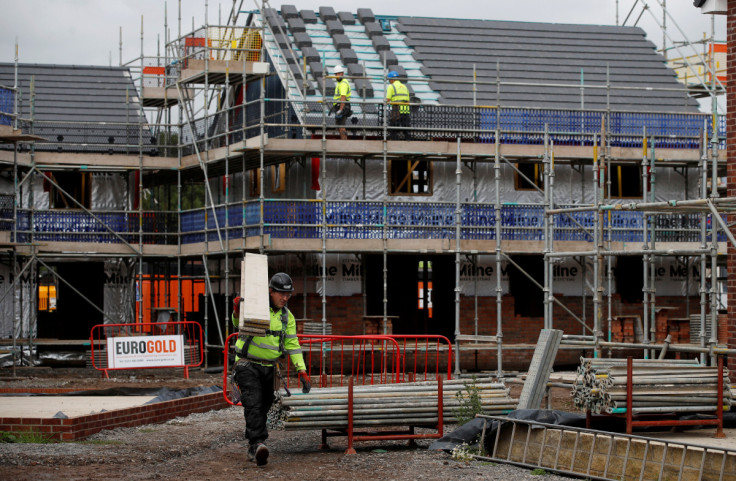
Barratt, the nation's largest housebuilder, has announced its acquisition of Redrow, a significant player in the industry, for a staggering sum exceeding £2.5 billion.
The amalgamation of Barratt and Redrow will birth a formidable entity, christened Barratt Redrow, expected to churn out approximately 23,000 homes annually, with a projected turnover surpassing £7 billion. As the curtains closed on financial markets this past Tuesday, the combined market value of the two giants stood tall at £7.2 billion.
The agreement, unanimously backed by the boards of both companies, also enjoys the support of Steve Morgan, the visionary founder of Redrow who kickstarted the enterprise half a century ago with a modest £5,000 loan from his father.
Holding a notable 16 per cent of the shares, Morgan lauded Barratt as a company he has long admired, expressing his belief that the merger would birth an unparalleled builder capable of accelerating the much-needed construction of homes.
Under the terms of the deal, Barratt shareholders will retain a commanding 67.2 per cent stake in the merged entity, leaving Redrow shareholders with the remaining 32.8 per cent. The iconic Redrow brand, renowned for its marketing of new homes and its upscale Heritage collection catering to affluent buyers, will endure alongside Barratt's more affordable David Wilson Homes, FT reported.
David Thomas, Barratt's incumbent chief executive slated to helm the newly formed conglomerate, foresees a scenario where all three brands—Barratt, Redrow and David Wilson Homes—coexist on the same development sites. Furthermore, he accentuated the potential to expand Redrow's geographical footprint, hinting at a strategic vision geared towards broader market reach.
Shareholders are poised to cast their votes on the deal come mid-May, subject to regulatory approval. With aspirations for completion earmarked for the latter half of the year, both Barratt and Redrow are eagerly anticipating the next chapter in their corporate saga as per reports.
The timing of this historic union coincides with a tumultuous period for developers grappling with the most significant housing downturn since the throes of the financial crisis. Despite weathering sharp declines in output, revenue and profits, both Barratt and Redrow have reported a glimmer of hope in the new year, buoyed by burgeoning mortgage approvals and reduced interest rates.
Redrow's pre-tax profits bore the brunt of the downturn, plummeting by 58 per cent to £84 million in the six months leading up to December 31st, whereas Barratt witnessed an 81 per cent dip to £95.2 million, largely attributed to a £62 million outlay on building safety repairs for older homes. Anthony Codling, an analyst at RBC Capital Markets, noted that amidst the nascent recovery in the housing market, housebuilders may find it expedient to acquire landbanks rather than construct them from scratch.
The RBC Capital Markets analyst Anthony Codling said: "Housebuilders are seeing the underlying housing market pick up and for those who are short of land into a recovering market, sometimes it is easier to buy a landbank than build one."
This landmark acquisition marks only the second such instance for Barratt in the past 16 years, harkening back to its acquisition of Wilson Bowden for £2.2 billion in 2007, a move that precipitated its ascent to the apex of the UK's housebuilding hierarchy and bestowed upon it the prestigious David Wilson brand.
Market reactions to the announcement were swift and pronounced, with Redrow's share price soaring by 13 per cent to 674p, juxtaposed against Barratt's shares which endured a dip exceeding 7 per cent to 491p.
Redrow investors stand to receive 1.44 new Barratt shares for each Redrow share they hold, translating to varying degrees of valuation for key stakeholders. Notably, Steve Morgan's stake is now valued at £373 million, reflecting a slight decrease from the previous valuation based on Tuesday's closing share price.
In the wake of the acquisition, Matthew Pratt, Redrow's chief executive, and Barbara Richmond, the company's chief financial officer, find themselves holding shares worth £760,000 and over £4 million, respectively. Pratt is slated to continue steering the helm of the Redrow business, while Richmond will provide oversight during the integration phase for a duration of 12 months.
Caroline Silver, the chair of Barratt, is set to lead the combined board, signalling a seamless transition towards unified governance.
However, questions loom large in the public discourse, with stakeholders like Steve Hoey, the chief executive of the non-profit group Turning Lives Around, expressing concerns about the new entity's commitment to addressing the pressing housing needs of the populace.
Barratt's dominance in the market is further underscored by its completion of 17,200 homes last year, accompanied by profits totalling £705 million, placing it ahead of Vistry Group. The latter, leveraging brands such as Bovis Homes, Linden Homes, and Countryside Homes, completed 16,124 homes last year following its acquisition of Countryside for nearly £1.3 billion in 2022.
Redrow, albeit a smaller player, holds its ground as the sixth-largest builder, having delivered 5,400 homes last year and reporting pre-tax profits amounting to £395 million. Aynsley Lammin, an analyst at Investec, lauded the deal as a pragmatic response to the prevailing challenges in planning and land acquisition, foreseeing a gradual improvement in sales rates and profit outlook.
The amalgamation is anticipated to yield cost savings in the ballpark of £90 million annually within three years, stemming from procurement efficiencies and the streamlining of divisional and central functions within the conglomerate. Notably, frontline employees stationed at construction sites and sales offices are not expected to bear the brunt of any impending restructuring.
Richard Hunter, the head of markets at the trading platform Interactive Investor, said: "The move is a seismic shift for the sector, reflecting not only the challenges which housebuilders have more recently faced in terms of the economic backdrop, but also a move to shore up the capabilities of two major players."







